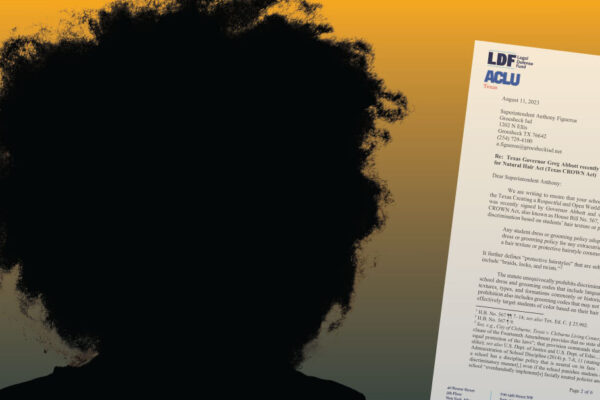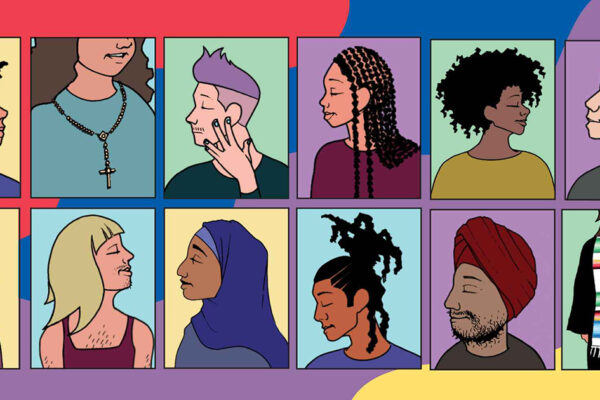HOUSTON — A multiracial, intergenerational coalition of advocates today filed a friend-of-the-court brief urging a Texas appellate court to end a Houston-area school district’s years-long practice of discriminating against Black students wearing racially and culturally significant hairstyles. The brief, filed in support of the George family in George v. Barbers Hill Independent School District, urged the court to uphold the Texas CROWN Act and protect students from the severe harms caused by discriminatory policing of students’ dress and grooming.
The brief was filed by the American Civil Liberties Union of Texas, Black Parents and Families Collective, National Congress of American Indians, Students Engaged in Advancing Texas, Texas NAACP, and IDRA, represented by counsel at ACLU of Texas, IDRA, and the Native American Rights Fund, in the First Court of Appeals in Texas.
The brief advocates for Darryl George, a Black Texas high school student unlawfully denied access to public education because of the length of his hair, which he wears in locs. “This Court can and must put an end to this unnecessary and painful litigation – initiated by a school district against a minor child,” the brief states.
Barbers Hill ISD suspended George for having long hair, which violates Texas law. The 2023 Texas CROWN Act prohibits public school districts from discriminating against hair textures and protective hairstyles commonly or historically associated with race and was enacted to allow students to express their cultural identities through their hair.
The brief provides critical context for the court to properly interpret and enforce the Texas CROWN Act, offering a historical and sociolegal analysis of the significance of protecting hair length to realize the statute’s purpose.
“Scholars and the courts have expressly recognized that long hairstyles are common expressions of racial and cultural identity, and the Texas Legislature enacted the CROWN Act to prohibit discrimination against them,” said Paige Duggins-Clay, chief legal analyst at IDRA. “Any interpretation of the Texas CROWN Act that would permit the destruction of long protective styles would thwart the Act’s inherent purpose and legislative intent.”
Black students often wear protective hairstyles such as locs, braids, Bantu knots, and twists to maintain healthy natural hair and celebrate their cultural identity. The brief demonstrates that leaving one’s hair uncut is historically associated with ancestral connection, cultural identity, and spiritual strength in many African and Indigenous communities.
“Neither Darryl George, nor any student, should ever have their education disrupted because of the way they wear their hair,” said Chloe Kempf, staff attorney at the ACLU of Texas . “The CROWN Act exists to protect Black, Indigenous, and other students of color from discrimination, and we urge the court to fully enforce this law. All students must feel free to express themselves and their cultural and family backgrounds in school.”
Many Black and Indigenous students wear long hair as a form of spiritual protection and symbol of moral strength and cultural pride. Indigenous students also often need their hair to remain long enough to wear items of regalia in cultural and religious ceremonies.
“Hair length rules force Native students to violate tenets of their religious and cultural beliefs in order to receive a public education. While cultural practices vary, many Native peoples regard hair as akin to an appendage, a visible expression of spiritual protection and cultural belonging, and only cut their hair under specific circumstances,” said Malia Gesuale, legal fellow at NARF. “Indian boarding schools once cut Native boys’ hair to prevent their students from practicing these beliefs and connecting with their Native culture. Then and now, no student should be targeted by their educators because of their hair.”
In addition to the Texas CROWN Act, the First and Fourteenth Amendments afford students protections against dress and grooming codes that violate their rights to liberty, equal treatment, and freedom of expression. Courts have also affirmed that parents have the right to direct the upbringing of their child, including in religious, cultural, and health practices related to hairstyle and hair length. In Texas and across the country, federal courts have ruled that school children’s rights to free speech, free exercise of religion, and an educational environment free from race and gender discrimination allow them to wear long hair, and other culturally significant hair styles, in school.
Access the amicus brief: https://www.aclutx.org/app/uploads/drupal/sites/default/files/darryl_george_amicus_brief_.pdf
Related Content

ACLU of Texas Finds 51 School Districts Likely Remain in Violation of the CROWN Act

Civil Rights Organizations Send Letter to Texas Superintendents Calling for Accordance with CROWN Act

Dressed To Express: How Dress Codes Discriminate Against Texas Students and Must Be Changed

ACLU of Texas, Partners Urge Federal Court to End Sex Discrimination in Darryl George Case
Stay Informed
Sign up to be the first to hear about how to take action.
By completing this form, I agree to receive occasional emails per the terms of the ACLU’s privacy statement.
By completing this form, I agree to receive occasional emails per the terms of the ACLU’s privacy statement.
